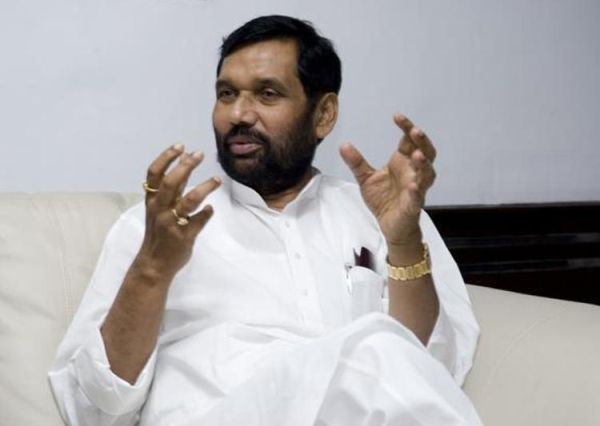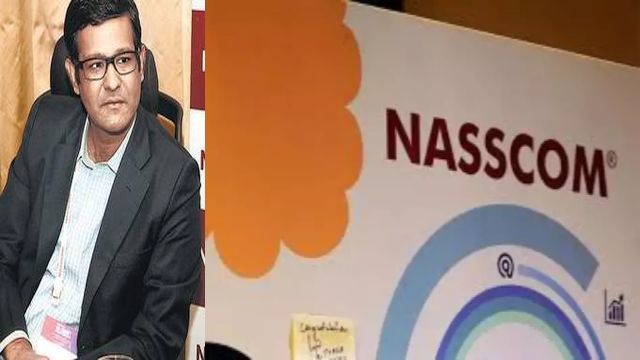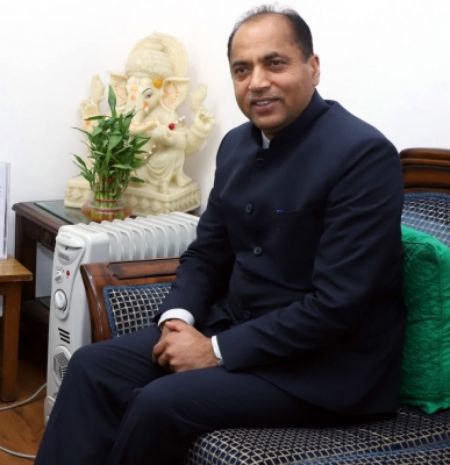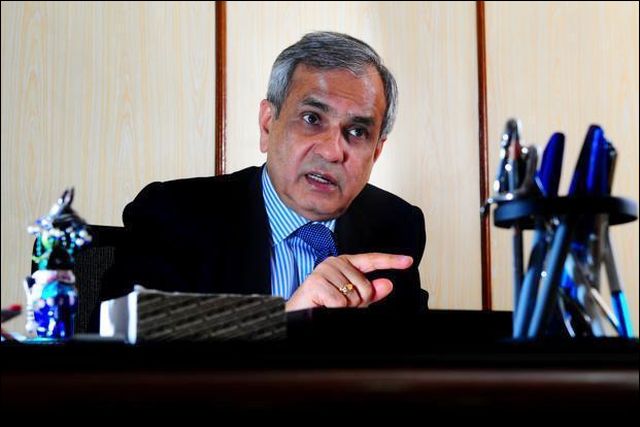
by admin | May 25, 2021 | Interviews, Politics
 By Saurabh Katkurwar and Brajendra Singh,
By Saurabh Katkurwar and Brajendra Singh,
New Delhi : Union Minister Ram Vilas Paswan says the NDA does not want the Pulwama attack and subsequent developments to become an election issue but “it cannot be ignored” as he made it clear that the government “is as serious as the people of the country” after the terror attack.
While not going into the specifics of what the government may do to retailiate against the Pakistan-sponsored operation in Pulwama, he acknowledges that there are expectations from the government to “act”.
In an interview to IANS, Paswan said he feels the much-talked about Grand Alliance of Opposition parties is a non-starter due to contradictions among the parties and will in no way affect the chances of NDA returning to power, says Union Minister and Lok Janshakti Party (LJP) chief Paswan.
He also rules out his dumping the NDA in case of a hung verdict in the coming Lok Sabha elections.
“We have done a lot of development work. We don’t need to make it an election issue. But the Pulwama incident cannot be ignored. The entire world is speaking now. US President Donald Trump has reacted. France has said it will take the initiative to get the Pulwama attack by Jaishe-e-Mohammed condemned in the United Nations Security Council (UNSC).
“We don’t want to make it a political or election issue. Every political party has come forward and has shown unity in national interest. What government will do I can’t say. But the government has taken it seriously. The government has taken it as seriously as the people have taken it,” he said on the Pulwama terror attack and the demands being made to avenge the terror sponsored from across the border.
Paswan said the people were outraged and the Prime Minister has clearly said that “every drop of soldier’s blood will be avenged”.
“Their sacrifices will not go in vain,” he said, adding people and parties should believe in what the Prime Minister has said.
Dismissing the possibility of the grand alliance being a threat to the NDA returning to power, he said the ruling coalition will get more number of MPs than now and Narendra Modi will again be the Prime Minister.
“I do not think there will be a pre-poll alliance (among Opposition parties). The NDA will be the biggest gainer and it will form the government as President will invite the majority pre-poll group.
“Do you think Mamata Banerjee will go along with Congress and the Left in Bengal? Will SP-BSP go with Congress in Uttar Pradesh? The situation is similar everywhere. There will not be any grand-alliance,” he said.
Asked about the description of the grand alliance as ‘mahamilavat’ (highly adulterated) by the Prime Minister and the BJP too striking deals with other parties in states, Paswan said there was nothing wrong with that.
“We are pure. There is no adulteration. They (Opposition) are adulterated. As Prime Minister says it is ‘mahamilavat’ (highly adulterated). In Opposition, all are tainted. Lalu Prasad is tainted, Mayawati is tainted, Akhilesh is tainted. Mamata Banerjee’s party is in Saradha scam,” he said.
The Union Minister also felt that the Congress contesting alone in Uttar Pradesh would cut into the votes of the Samajwadi Party (SP) and Bahujan Samaj Party (BSP) which would benefit the Bharatiya Janata Party (BJP).
“The SP-BSP alliance is not going to continue because the man who built the SP, Mulayam Singh Yadav, is against it,” Paswan said and recalled Yadav’s praise in the Lok Sabha and his wish to see Modi return to power.
Asked about challenges being posed by the Rashtriya Janata Dal (RJD)-led grand alliance in Bihar, Paswan said that it will have no impact on the NDA.
“We are in solid position in Bihar whereas in the Opposition camp, there is uncertainty over distribution of seats. If someone gets lesser seats than expected, it will come out of the grand alliance. The Congress cannot go with the RJD. There is no question of if and but. We will win Bihar and Uttar Pradesh too despite opposition alliance,” he said.
To a query about what will be his party’s strategy in case of a hung verdict and NDA not being in a position to form the government, Paswan said, “We are with the NDA and will remain with the NDA.”
Talking about why the NDA will come back to power, the Minister said that the tax sops for those with annual income of Rs 5 lakh and schemes like the Ayushman Bharat health scheme, housing scheme for poor and toilet, electricity and gas in all the poor homes would vouch for the government’s performance.
The decision to provide 10 per cent quota for economically weaker sections would also remove the anger among the upper castes while issues like demonetisation and rural distress have faded into the background.
—IANS

by admin | May 25, 2021 | Interviews

Chief Election Commissioner S.Y. Quraishi
By Saket Suman,
New Delhi : The electoral bonds are a regressive reform that has further worsened the “problem of cronies running the country”, says former Chief Election Commissioner S.Y. Quraishi, who favours a complete ban on corporate donations to parties.
Maintaining that the “role of money power” is the biggest challenge to free and fair elections in India, he says that while politicians are supposed to be representing the people, electoral bonds have enabled the corporates to run the country.
“It is in this context that I strongly advocate state funding of political parties and a blanket ban on all corporate donations. Such drastic measures are called for, as the problem is becoming worse with every election cycle,” Quraishi, who joined the Indian Administrative Service in 1971 and went on to become the 17th CEC of India, told IANS in an interview.
He said that in the name of ‘reform’, the electoral bonds have made the situation “predictably worse” as it has legalised crony capitalism.
“Corporates can now donate 100 per cent of the profits to one political party and control the politics of the country,” he added.
Quraishi, who has just published a book titled “The Great March of Democracy: Seven Decades of India’s Elections” said that there is “much to celebrate” as India proved the skeptics wrong by emerging as a secular and pluralistic democracy.
Despite setbacks in pre- and post-independence history, Quraishi said, our resolve to preserve democratic norms and institutions has been firm. “But our politicians are letting the citizens down due to lack of political will and lethargy,” he lamented.
He said that all political parties “remain united” in their opposition to meaningful electoral reforms aimed at barring tainted legislators from contesting legislators.
“The situation is far from fair when prisoners can’t vote in elections but alleged perpetrators of heinous crimes can freely contest elections,” he said.
He said that the Supreme Court verdict on criminalisation of politics (2018) was “disappointing” as it put the ball back in the EC’s court instead of pressing the government for bringing in legislation.
“It is hard to imagine why the political parties will legislate against their own self interest. No party agrees upon an independent audit of their accounts. To add to that, they have sham inner party elections for choosing candidates,” he said.
He also shared that despite the demand for appointment of ECs through a collegium receiving massive support from the civil society and also in the 2015 Law Commission Report, the ruling parties refused to let go of their power to appoint the Chief Election Commissioner and other ECs.
Quraishi said that these issues have pragmatic and workable solutions, which have already been tested in many democracies of the world and urged the political parties to start putting self interest after national interest to solve the issues which ail the electoral system.
(Saket Suman can be contacted at saket.s@ians.in)
—IANS

by admin | May 25, 2021 | Corporate, Corporate Buzz, Interviews, Markets, Technology
 By Bhavana Akella,
By Bhavana Akella,
Bengaluru : As the demand for disruptive technologies like Artificial Intelligence (AI) and Data Analytics grows, shortage of a skilled IT workforce to run them is posing a challenge to the stake-holders, Nasscom, the industry’s apex body, has said.
“There is an urgent need to re-skill about 50 per cent of India’s IT workforce, as demand for it in new technologies remains unmet,” Nasscom’s IT-ITeS (IT enabled Services) Sector Skills Council chief executive Amit Aggarwal told IANS here.
The National Association of Software and Services Companies (Nasscom) is the apex body representing the country’s IT and business process management (BPM) industry.
The demand-supply gap for skills affected the industry’s performance in 2018, due to shortage of 140,000 skilled techies for 500,000 jobs in the industry across verticals.
“Going forward, the industry will face a shortage of 230,000 skilled techies as jobs in AI and Big Data are estimated to be 780,000 by 2021,” Aggarwal pointed out.
In a report titled ‘The Future of Jobs 2018’, the World Economic Forum (WEF) said around 54 per cent of the global workforce had to be re-skilled or up-skilled to work in disruptive and digital technologies spawning the virtual world.
AI, big data analytics and cloud computing will dominate businesses across verticals till 2022, changing job profiles for geeks, while legacy jobs will vanish, the report said.
Admitting that the multi-billion-dollar IT industry had a vital role in creating jobs as well as in churning out the required skilled workforce, Aggarwal said India was well-positioned to bridge the demand-supply gap, as it had a wealth of talent in science, technology, engineering and mathematics (STEM).
“Adoption of new technologies will change the profile of present jobs, which will evolve into higher domains with more automation that pose challenges to the $167 billion Indian IT services industry,” Aggarwal asserted.
One of the challenges is to identify the nature of jobs in future and re-skill the present workforce for the transition to digital work.
As the industry adopts to new technologies spanning AI, machine learning (ML), data analytics, automation, robotics, blockchain, cloud and the Internet of Things (IoT), companies with legacy systems and obsolete workforce face challenges to survive the disruption.
The apex body’s ‘Future Skills’ digital platform, unveiled by Prime Minister Narendra Modi in February 2018, has identified 10 key technologies in which maximum job creation can occur in the IT and IT-enabled Services sectors.
The digital portal makes resources available for techies to hone their skills. According to the platform, technologies which will create new jobs include AI, cyber security, IoT, virtual reality, robotic process automation, big data analytics, blockchain, three-dimension (3-D) printing, cloud computing and social and mobile.
“About 70 job roles were identified across 10 technologies that will require the future workforce to have about 150 varied skills,” Aggarwal said.
Besides training the workforce in new skills, there is a need to include evolving technologies in the curriculum for the students, Aggarwal noted.
The industry body has tied up with state-run premier institutions like the Indian Institute of Technology-Madras to hone the skills of students entering the workforce in the IT sector.
“The industry is spending about Rs 10,000-crore for re-skilling and human resource development,” Aggarwal pointed out. “Making the system agile and flexible can help in preparing the IT workforce for the future,” Aggarwal reiterated.
(Bhavana Akella can be contacted at bhavana.a@ians.in )
—IANS

by admin | May 25, 2021 | Interviews, Politics
 By Vishal Gulati,
By Vishal Gulati,
Shimla : Facing the challenge of retaining all the four Lok Sabha seats, Himachal Pradesh Chief Minister Jai Ram Thakur says he is not being dictated to by the RSS and that he enjoys a free hand to lead the party in the coming elections.
For him, development work and no witch hunting is the mantra.
“This accusation (of RSS remote controlling him) does not have an iota of truth. “Our central leadership has reposed full faith in me and has given a free hand to run the affairs in the state. The RSS is an apolitical nationalist organisation, which has nothing to do with state affairs,” Thakur told IANS in an interview, dismissing rumours in political circles that he is being dictated by BJP ideologue Rashtriya Swayamsevak Sangh (RSS) and party’s senior leaders.
Five-time legislator Thakur (54) was elevated after the BJP’s chief ministerial candidate, Prem Kumar Dhumal, suffered an abject defeat in the 2017 assembly polls. Several names were doing the rounds at the time, including that of Union Health Minister J.P. Nadda, whom the party did not relieve from national politics.
“I don’t think there is anything wrong in seeking the advice of Dhumal and Nadda, on any regarding matter related to the development of the state,” Thakur stated categorically.
On getting free hand from the high command to lead the party in the elections, Thakur, who has won his fifth consecutive assembly election, said: “The elections are fought with collective efforts and with collective strategy. Being head of the state I would have greater responsibility to motivate the rank and file to ensure the party’s victory.”
“I am fully confident that the BJP will retain all the four Lok Sabha seats (from the state) in the General Elections,” Thakur added.
Carrying out development on the debris of decades of vendetta politics, Thakur said the BJP has brought a generational change in the state politics.
“This change has brought new ideas of governance. Shunning the politics of revenge and counter accusations, we have put forth development as our guiding principle in reforms. We have taken several new people-centric initiatives in 13 months,” the plain-speaking Thakur said.
The first-time Chief Minister, who has 11 ministers — half of them first-timers, believes the biggest achievement of his government has been winning over the confidence of the people.
“The government from the day one started working with a sole aim of development and welfare of the people. My government is working without any vendetta and vengeance towards our political opponents.”
The state, he said, has implemented several decisions and schemes which are bound to transform the economy and the people.
“The Jan Manch (public meeting in every district headquarters on first Sunday of a month) programme launched by us has been appreciated even by our political opponents.
“Till date, over 33,966 grievances of the public have been redressed in 106 Jan Manchs. Similarly, the very first decision of the government to lower the age limit of senior citizens for availing old-age pension without any income criteria from 80 to 70 years have benefitted over 1.60 lakh people,” he said.
Thakur, who rose through the ranks, believes establishing direct contact with the common masses will definitely help his party retaining four Lok Sabha seats in the ensuing General Elections.
On the central leadership reposing faith in him and his first-time cabinet colleagues and bringing generation change in the state politics, he said: “Yes, I agree that the Vidhan Sabha elections results of 2017 brought in a generation change in the state politics. Since all my cabinet colleagues are young and have a new vision and new vigour, this would definitely help progress and development of the state.”
“I did not face any challenge as such during the last one year. But still the major concern before me has been to bring back the derailed economy of the state back on track and understand the developmental aspirations of the people. For this, I toured 65 (of the 68) assembly constituencies during this one year to understand the developmental needs.
“I am sure that after a year in office now I am more clear and precise about the expectations of the people,” he said.
The Himalayan state, whose hydropower generation as well as horticulture and tourism are major contributors to the economic development, is facing one of its worst financial crises – with its loan liability at nearly Rs 50,000 crore.
“We have inherited a loan burden of over Rs 46,500 crore from the previous government due to their financial mismanagement and unmindful expenditure. Therefore, the biggest challenge before us was to bring back the derailed economy back on the track.”
“It is true that due to limited financial resources of its own the state has to heavily depend on financial assistance and loans from the Centre and external funding agencies. Still soon after assuming the office in the state, the government took some concrete steps to stop wasteful and unproductive expenditure, besides striving hard to create its own resources for income generation.”
(Vishal Gulati can be contacted at vishal.g@ians.in)
—IANS

by admin | May 25, 2021 | Interviews, Politics

Rajiv Kumar
By Vishav,
New Delhi : Terming Congress President Rahul Gandhis promise of a minimum income guarantee to poor unimplementable, NITI Aayog Vice Chairman Rajiv Kumar says it is similar in nature to former Prime Minister Indira Gandhis ‘garibi hatao slogan.
He says India neither had the kind of fiscal space, nor the kind of complete data needed to implement the scheme.
Kumar also opposed the idea of Universal Basic Income, often advocated by former Chief Economic Adviser Arvind Subramanian, saying he favoured incentives for population to work.
The NITI Aayog Vice Chairman said the Congress needed to explain to the country how it can afford a scheme like minimum income guarantee.
“I don’t think it is practical. I think it is more rhetorical. It is similar in nature to ‘garibi hatao’. And I don’t think its implementation will be feasible. We neither have that kind of fiscal space, nor that kind of complete data that you need were you to be able to implement it,” Kumar told IANS in an interview.
“This is why, I think, the Congress has left all details completely unclear and have only made a broad announcement,” he added.
Former Finance Minister P. Chidambaram has, however, said that the broad contours of the scheme justifying its implementability would be explained in the Congress manifesto.
Rejecting the idea of Universal Basic Income for Indians, Kumar said: “I have not been a supporter of the scheme. For India’s per capita income and its demographic profile, I would much rather have incentives for work rather than incentives for being in on social security.”
“I think a lot of countries, especially something like China, have done very well by empowering their young in employment rather than putting them on doles,” he said.
The economist also defended the government’s newly-launched Rs 6,000 direct income support to farmers and rejected criticism that the amount was too little.
“About it being too less, the average income of a poor or marginal farmer household per month is probably in the range of Rs 3,000 to Rs 4,000. And in that context, an additional Rs 500 does not sound so little. It should not be dismissed, neither should it be demeaned.
“This amount can be used (by a farmer) to send his child to school, to buy rations, to buy water from large land-owners, and so many other things. It’s not a small amount,” he said.
“Another way to look at it is that in 10 years, you get Rs 60,000. It’s not a one-time sop. It’s a long-term relief. In terms of government expenditure, Rs 75,000 crore becomes Rs 7.5 lakh crore in 10 years. It’s a fair, significant fiscal burden,” he added.
Kumar said that one can always criticize a measure saying it is too little, but it has to be balanced with fiscal responsibility.
“Having seen poor households, I don’t think the sum is too small. It is a significant percentage of total income, not something that disappears in the decimal as you would tend think.”
He added the criticism that the scheme leaves out a large part of urban poor out of its net was also unfair and said only 13.7 per cent of farmers were tenants even out of which, 80 per cent owned some land or the other.
“So hardly anyone is left out among the agriculture farming households. The only people who are not included are the landless labour. That is only 2.6 per cent of the rural population. That has been left out because for them, there is MNREGA. That is what gives them social security,” Kumar said.
“The coverage is not narrow. It covers 12 crore households – around 60 crore people. It is much bigger than any farm loan waiver would cover, which are by nature skewed or biased towards larger land-owners.”
In a sharp criticism of loan waiver schemes announced by the newly-formed governments in the Hindi-heartland states of Rajasthan, Madhya Pradesh and Chattisgarh, he said it was not the answer to agricultural distress.
“Farm distress can be sorted out through true modernisation of the sector – convert farmer from mere producer of commodities to a producer of agricultural value products. The second part of solving the crisis is to connect the farmer to the market – get logistics in place.
“And finally, you have to lower the cost of production in agriculture. At the moment, Indian agriculture products are higher-priced than global prices. There I think, one has to move away from the model of increasing doses of chemical inputs into agriculture, resulting in higher cost, higher debt and higher distress. We need to shift to bio pesticides, bio-fertilizers,” Kumar said.
—IANS

 By Saurabh Katkurwar and Brajendra Singh,
By Saurabh Katkurwar and Brajendra Singh,



